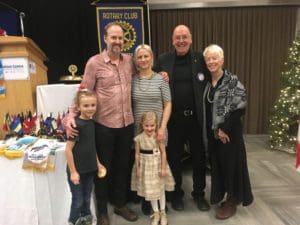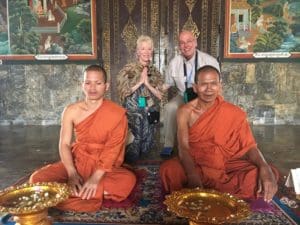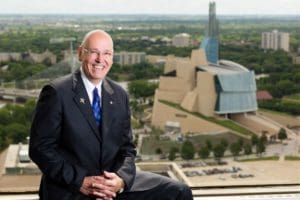Resolving Disputes Within Adversarial Systems. Member Spotlight: David G. Newman, Q.C.
David is a strong believer that we are all part of one humanity, one loving energy. He is currently a director of Rotary District 5550 in Winnipeg and Chair of its World Peace Partner Committee. He advocates for the inclusion of restorative justice and alternative dispute resolution in Manitoba’s legal system and advocates for the abolition of nuclear weapons and other existential threats to humanity to be understood and urgently addressed. In 2017, David and the Dean of the University of Manitoba Law School collaborated to host a conference for nuclear disarmament issues at the Canadian Museum for Human Rights in Winnipeg. The gathering was attended by participants from around the world. A book was published with articles of the presenters focusing on the moral and humanitarian implications of nuclear risks and threats.
Freedom as Social Importance
After studying labour relations at Dalhousie Law in Halifax, David went on to become an active part of the legal labour relations movement in his home province of Manitoba. It became apparent to him early on in his legal studies that labour relations, balancing of competing interests and dispute resolution were an integral part of social policy needs at both the provincial and federal levels. He saw the importance of countervailing powers between the wealth creators and possessors and those that do the work in order to generate wealth for the benefit of all.
Soon after the completion of his studies, David returned to his home city of Winnipeg to complete his articling. He was encouraged by his principal at the firm he joined to speak at the Manitoba Federation of Labour provincial conference. The topic for this engagement was “Management Rights”. David explained, “I knew that this would position myself for the future.” He acknowledged the fact that he would either be embraced by the labour relations community as an ally of unions or viewed as a foe. He thought very carefully about this and how he considered prerogative rights as a colonialist idea that had been welcomed by management throughout North America at the time. David made the decision to speak about management freedoms. He likened labour relations relationships to a kind of group family law where enduring good relationships among the immediate and multi-stakeholder interests are critical to optimal functioning and peace and goodwill. He identified the importance of each party playing its intended role. Managers protect the freedom to manage. Unions protect the wellbeing of employees. Most of the attendees were startled by his presentation, but also saw it as an approach that possessed value. But the result was he became a lawyer for individuals and management, not mainstream unions. He considered himself a “freedom advocate and teacher.”

“Unions and management were too resistant to change, trying to protect and hold on to what power and rights they had, rather than co-creating solutions to issues at the bargaining table. The importance of vocabulary and empathy in coming to agreements, identifying issues properly, and replacing power as the means to “win” a negotiation with an intelligent dialogue about how to get along and mutually benefit is critical to optimal benefits to all concerned.” David saw freedom as societal importance, not only for employees and owners but in the public interest and the economy as a whole.
Policy Planning Throughout Canada
 When entrusted with the responsibility and freedom to create system changes, David continued to work as an innovator and educator and worked for entrepreneurial freedoms for the benefit of all. He went on to offer himself to public service by running for public office in 1995. He advocated for balanced budgets and debt eradication so as not to impose financial burdens upon future generations. He likewise fostered support for a multigenerational approach to sustainable development and addressing social issues focusing on lasting outcomes for generations ahead in Manitoba. He continues to do this as a lawyer and volunteer.
When entrusted with the responsibility and freedom to create system changes, David continued to work as an innovator and educator and worked for entrepreneurial freedoms for the benefit of all. He went on to offer himself to public service by running for public office in 1995. He advocated for balanced budgets and debt eradication so as not to impose financial burdens upon future generations. He likewise fostered support for a multigenerational approach to sustainable development and addressing social issues focusing on lasting outcomes for generations ahead in Manitoba. He continues to do this as a lawyer and volunteer.
Before being appointed to cabinet in 1997, he was asked to lead a review of the civil justice system in Manitoba. By working in the government, David fully realized the importance of including all people and multiple generations into policy planning. The report was published in 1996. The report led to the ability, ethical capacity and insurance protection for lawyers to become mediators. The report devoted several pages to show how to shift from adversarial process to getting to agreement processes. The cover page exhibited a circle of people holding hands around a scale of justice with a smaller circle beside the scales of justice. The point of the image is that it was the peoples’ system, not the lawyers’ and judges’ system.
As a champion for systems change and a restorative justice advocate, David was entrusted with responsibilities for Indigenous Peoples, Northern Affairs Communities, Energy and Mining, Manitoba Hydro, and the Community Economic Development Fund. In wanting to expand his knowledge of restorative justice facilitation, he collaborated with indigenous leaders in the community and developed a training program with indigenous elders. From 2006-2009 he served on the Nunavut Planning Commission to learn from the amazing Inuit Peoples in the far north.
A Disruptor at Heart
 For more than 16 years, David’s Rotary district has been bold and continued its path of, “Nurturing, nudging, and integrating change in systems,” especially in the provincial education, family services, and legal system. He promotes positive peace, local to global, through peace literacy education and action. Today, positive peace and peace literacy are being integrated into Manitoba’s education system. David joined MBBI recently and attended the Congress in Bali, “It was for disruptors – he found a new home,” he said with a smile. He was a board member of the Rotary Action Group for Peace from 2016-19. He is on the National Board of Honouring Indigenous Peoples, and he continues to live his life trying to live by example and promote the kind of good governance needed to advance truth and reconciliation, inspired by the UN Declaration on the Rights of the Peoples and the 94 Calls to Action of the Truth and Reconciliation Report based on voluminous research on the facts and history of the impact of residential schools on multiple generations of Indigenous Peoples in Canada.
For more than 16 years, David’s Rotary district has been bold and continued its path of, “Nurturing, nudging, and integrating change in systems,” especially in the provincial education, family services, and legal system. He promotes positive peace, local to global, through peace literacy education and action. Today, positive peace and peace literacy are being integrated into Manitoba’s education system. David joined MBBI recently and attended the Congress in Bali, “It was for disruptors – he found a new home,” he said with a smile. He was a board member of the Rotary Action Group for Peace from 2016-19. He is on the National Board of Honouring Indigenous Peoples, and he continues to live his life trying to live by example and promote the kind of good governance needed to advance truth and reconciliation, inspired by the UN Declaration on the Rights of the Peoples and the 94 Calls to Action of the Truth and Reconciliation Report based on voluminous research on the facts and history of the impact of residential schools on multiple generations of Indigenous Peoples in Canada.
David continues to work in the legal system, now trying to pursue the little circle identified in his vision in 1996, a vision that the concept of Restorative Justice and the integration of Indigenous Peacemaking methodologies will become part of the legal system to make it a more effective accessible justice system for the benefit of all concerned. Currently, two judges from the Michigan Supreme Court, mainstream lawyers, law school professors, social justice activists, and Indigenous Tribal Jurists and Indigenous lawyers and other champions for transformative justice who are practitioners of restorative justice, educators and social workers are working on making this vision a reality. His goal is an awakening of a passion and movement to bring more justice into the existing legal systems and supportive relationships between traditional British and French systems of law and Indigenous legal systems and Indigenous laws in North America. Reciprocity and harmonization are evolving between mainstream and Indigenous courts and their respective judgments, orders, rules, and laws.
David has been uncomfortable with the traditional adversarial win-lose approach to conflict resolution and had a desire to pursue a peacebuilding approach instead. He cautions that one cannot be naïve about how to trigger peacebuilding. Making the case for unattractive options is more often the only way to get the attention of adversaries to engage in peacebuilding. The sooner this choice is made, the better for all. He seeks to help people understand themselves and achieve a life of purpose, meaning, and belonging that is important to them. As a lawyer and mediator, he learned that “The most important role of a lawyer in the service of any human being is to help them solve their own problem. Here’s what the realities are, here are the choices, which way do you want to go. Further, it is important to understand your primary role as a facilitator. You never are there to fix somebody’s problems, you are there to facilitate them fixing their own problems with your help.”
Article by Kylea Shropshire, MBBI Writer

